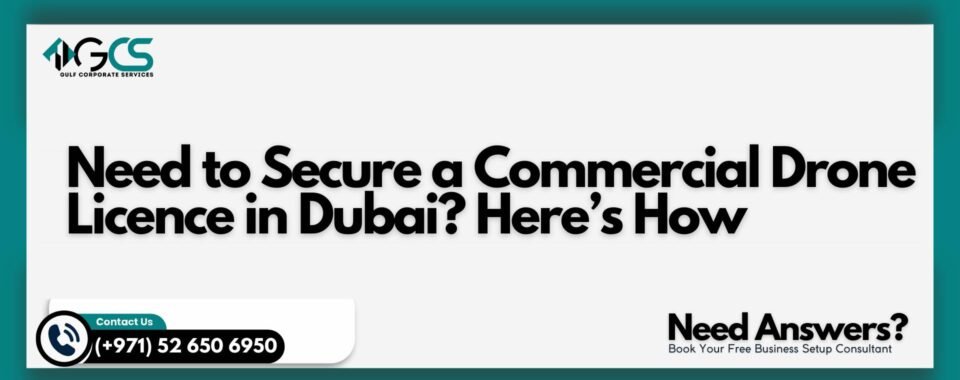
Dubai leads the world in innovation—and commercial drone use is no exception. Whether you’re capturing stunning aerial visuals, inspecting skyscrapers, or streamlining logistics, obtaining a commercial drone licence is the first crucial step. Here’s an in-depth, step-by-step guide with all the details you need.
Why You Need a Commercial Drone Licence in Dubai 🛩️
Operating a drone for commercial purposes in Dubai isn’t just about flying skill; it’s about following the law, ensuring safety, and gaining trust.
- Legal requirement: Flying without a licence can result in fines, confiscation, or even legal action.
- Client assurance: A licence proves you’re trained, authorized, and operating legitimately.
- Insurance eligibility: Most insurers require commercial licensing before covering you.
- Airspace access: A licence gives you permission to fly in more restricted areas for business operations.
Regulatory Bodies Overseeing Drones in Dubai
Multiple authorities regulate commercial drone use in Dubai:
General Civil Aviation Authority (GCAA)
Sets national-level rules for drone safety, licensing, and approved drone models.
Dubai Civil Aviation Authority (DCAA)
Handles local licence applications, airspace access permission, and detailed operational permits.
Telecommunications and Digital Government Regulatory Authority (TDRA)
Manages frequency allocation for drone communications and anti-drone signals.
Working with these agencies ensures you’re following Dubai’s official procedures and regulations.
Types of Drone Licences and Permits in Dubai
Understanding which licence or permit suits your purpose is key:
- Commercial Licence: Mandatory for any drone used in exchange for payment.
- Aerial Work Permit: Designed for specialized services like mapping or thermal inspection.
- Recreational Permit: For hobby flights only; restricted to specific zones.
- Training Organisation Permit: Required if you’re offering official drone training.
This guide focuses on obtaining a Commercial Licence for aviation professionals.
Who Requires a Commercial Drone Licence?
You need a licence if your drone activities involve:
- Filming real estate, weddings, or events for clients
- Performing infrastructure inspections (buildings, bridges, towers)
- Conducting aerial surveys, mapping, or agricultural analysis
- Delivering products by drone (under trial or regulatory permission)
If there’s any commercial angle, it’s vital to get certified.
Initial Requirements Before You Apply
Before applying for a licence, make sure you tick all the boxes:
- Minimum age: 21+
- Valid UAE ID or Emirati passport
- Clean police clearance
- Completion of approved training (theory + flight hours)
These preconditions are non-negotiable and ensure only qualified, reliable pilots make the cut.
Step 1: Registering Your Drone
Every commercial drone must be officially registered:
- Select a DCAA or GCAA-approved drone model (e.g. DJI Matrice)
- Submit details: model name, serial number, and proof of purchase
- Pay registration fees (AED 500–1,000)
- Receive an official drone registration certificate
A registered drone is essential before your name goes on the aviation licence.
Step 2: Complete Pilot Training
Training is mandatory—and certification is key:
Theoretical Module
Covers air law, safety regulations, meteorology, and aviation basics.
Practical Flight Module
Hands-on training: takeoff, landing, aerial maneuvers, mission planning.
Testing
Written and practical exams ensure you’re competent.
Training is completed through approved drone schools and costs vary based on type and duration.
Step 3: Apply for the Commercial Drone Licence
Once trained, here’s how you apply:
- Gather documents: passport, ID, police clearance, training certificate, drone registration, health certificate.
- Fill in the DCAA online application for a Commercial Pilot Licence.
- Pay the licence fee (AED 1,500–3,000).
- Await approval (2–4 weeks average).
After approval, you’ll receive an official Commercial Drone Pilot Licence.
Step 4: Apply for Individual Flight Permits
Licence-only gives authorization, not automatic flight rights.
- Operational plan: Location maps, dates, risk assessment
- Airspace clearance: Required especially near airports or wealthy zones
- Local notifications: Police or neighborhood authorities may need notice
- Permits cost AED 300–700 per project and must be obtained well before flight dates
Step 5: Insurance Coverage
Although not mandatory, insurance is strongly advised:
- Hull coverage: Covers damage or theft of your equipment
- Third-party liability: Protects against injury or property damage to others
Insurance premiums typically range from AED 2,000 to 5,000 per year.
Breaking Down the Costs
Here’s a snapshot of typical expenses:
| Item | Estimated Cost (AED) |
| Drone purchase | 3,000 – 30,000+ |
| Drone registration | 500 – 1,000 |
| Pilot training & exams | 5,000 – 10,000 |
| Pilot licence | 1,500 – 3,000 |
| Flight project permits | 300 – 700 each |
| Annual licence renewal | 500 – 1,000 |
| Drone insurance | 2,000 – 5,000/year |
Generally, setting up costs begin from AED 15,000, depending on your scale.
Step 6: Essential Operational Guidelines
Once licensed, safe flight operations matter:
- Always follow pre-flight checklists
- Fly below 400 feet and away from people or buildings
- Use approved flight planning apps for no-fly zones
- Maintain a flight log and schedule battery checks
- Stay updated on regulations with monthly bulletins from GCAA/DCAA
Staying safe and legal ensures a good reputation and repeat business.
Step 7: Licence Renewal & Ongoing Compliance
Your licence lasts for one year.
Each year, you need to:
- Pay renewal fees (AED 500–1,000)
- Show there are no violations
- Renew insurance and drone registration
- Potentially take a short refresher course
It’s essential to plan and budget for renewal before your licence expires.
Common Obstacles and How to Solve Them
Delays in Application
- Double-check all documents
- Work with certified consultants for fast turnaround
Airspace Limitations
- Use authorized flight planners
- Seek help from clearance brokers if needed
High Training Fees
- Look for recognized schools offering packaged rates or installment plans
Finding Accurate Insurance
- Work with brokers who know local drone regulations
Business Opportunities After Licensing
Once you hold a licence, you can tap into many revenue streams:
- Real Estate: cinematic property walkthroughs and promotional videos
- Construction/Infrastructure: inspections, monitoring, time-lapse
- Agriculture: land surveys, field health analysis
- Events: aerial coverage of corporate events and weddings
- Advertising: branded aerial content and outdoor displays
- Emerging Delivery: initial trials in e-commerce and health sectors
With a licence, you’re well-positioned to serve top-tier industries.
Marketing Tips for Your Drone Services
- Build a professional website with your best work
- Use SEO keywords like “Dubai commercial drone licence” or “drone services UAE”
- Show case studies to attract real estate or inspection clients
- Partner with event planners, real estate brokers, and engineers
- Attend trade shows and pitch to government or corporate buyers
Your expertise combined with strong marketing will elevate your brand.
Scaling Your Drone Business Beyond Dubai
Once established:
- Apply for licences in Abu Dhabi, Sharjah, Ajman
- Add more pilots and drones to scale operations
- Go regional—serve the UAE market and neighboring Gulf countries
With planning, you can become a regional leader in commercial drone services.
Learn More: Business Setup in Dubai
Conclusion
Securing a Commercial Drone Licence in Dubai involves careful planning, training, licensing, and insurance. But once you’re legally airborne, the sky is truly the limit. With growing demand in real estate, infrastructure, agriculture, and media, licensed operators have strong earning potential.
If you want to build a drone business grounded in legitimacy and professionalism, follow this roadmap—and start shaping your future, one flight at a time.
FAQs
How long does it take to get a commercial drone licence?
Typically 4–6 weeks, depending on training schedules and processing time.
Can tourists apply for a commercial licence?
No—you must have a UAE residency visa and Emirati ID.
Do I need insurance to fly commercially?
Not mandatory, but most clients and authorities require it.
Can I fly at night after licensing?
Yes—with extra approvals and appropriate drone equipment.
What if I fly without a licence?
You could face fines, drone seizure, and possible legal charges.








